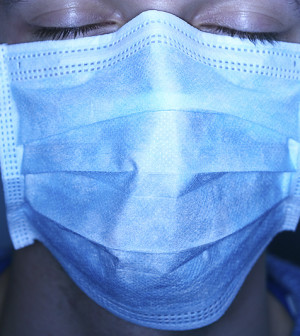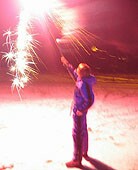- Could Artificial Sweeteners Be Aging the Brain Faster?
- Techniques for Soothing Your Nervous System
- Does the Water in Your House Smell Funny? Here’s Why
- Can a Daily Dose of Apple Cider Vinegar Actually Aid Weight Loss?
- 6 Health Beverages That Can Actually Spike Your Blood Sugar
- Treatment Options for Social Anxiety Disorder
- Understanding the Connection Between Anxiety and Depression
- How Daily Prunes Can Influence Cholesterol and Inflammation
- When to Take B12 for Better Absorption and Energy
- Epsom Salts: Health Benefits and Uses
How to Avoid July Fourth Allergy Flare-Ups


(HealthDay News) — Fireworks, picnics and parades are favorite Fourth of July traditions for many people, but for those with allergies or asthma these activities could be uncomfortable or even dangerous.
“Summer is the time of year when everyone wants to enjoy being outside,” said allergist Dr. James Sublett, president of the American College of Allergy, Asthma and Immunology. “That’s why it’s so important to be prepared, so allergies and asthma don’t overshadow the festivities.”
Asthma and allergy experts offer these tips for avoiding or coping with common summer triggers, particularly on the holiday weekend:
- Smoke: Fireworks and campfires are fun holiday traditions but smoke can trigger an asthma flare-up. Try to maintain a safe distance from fireworks and campfires or stand upwind. It’s also important to carry a reliever inhaler at all times.
- Chlorine: Chlorine isn’t an allergen, but it can cause allergy-like symptoms, such as itchy eyes. For people with asthma, chlorine could also cause breathing problems. If irritation develops, wash the affected area with clean water. People with a more serious reaction may need a prescription corticosteroid cream.
- Stings: Insect venom can cause serious or life-threatening reactions that require immediate medical attention. Facial swelling and trouble breathing are signs of a severe allergy that may require epinephrine (adrenaline) and evaluation by an allergist. In some cases, those with an insect allergy are treated with allergy shots.
- Temperature swings: A rise in temperature can cause an asthma attack. So can walking into a chilly, air-conditioned room or jumping into a cold swimming pool. Be aware of environmental temperatures and consider exercising indoors on particularly hot, humid days.
- Mold: Allergies to mold are common in late summer and fall. Avoid walking on or near freshly mowed grass or dry, dusty athletic fields, which could increase exposure to mold.
Anyone who experiences allergy symptoms that interfere with normal summer activities should be properly tested for allergies.
More information
The Asthma and Allergy Foundation of America provides more information on how to avoid allergy triggers.
Source: HealthDay
Copyright © 2026 HealthDay. All rights reserved.










